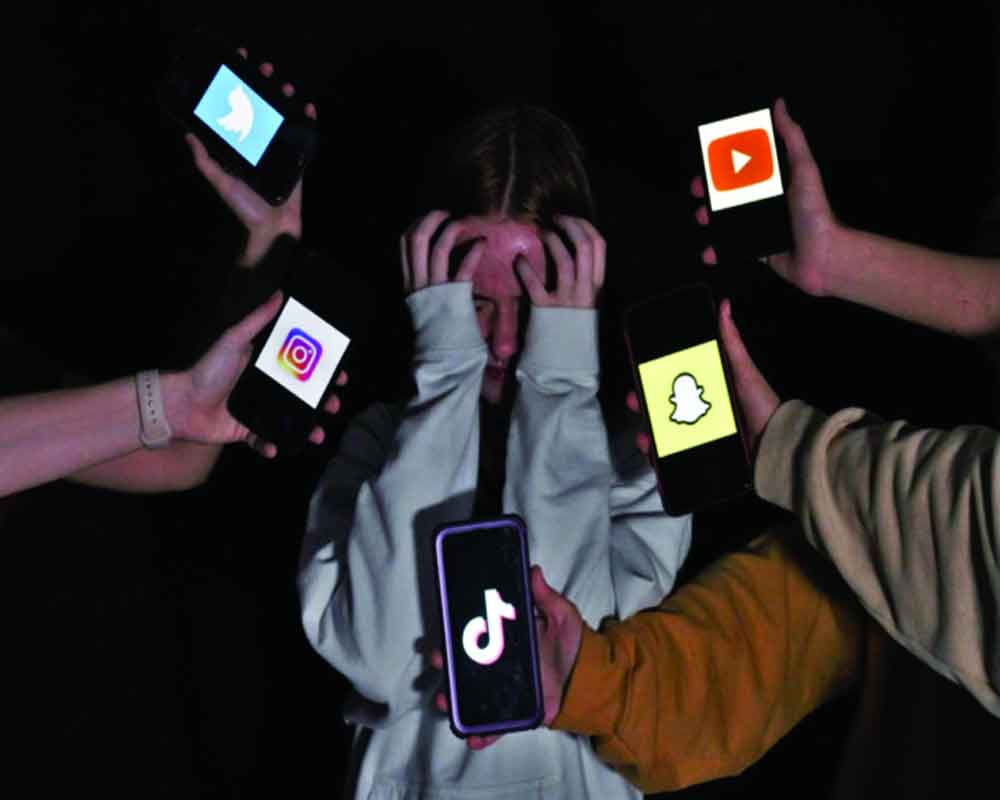Social media often promotes formation of echo chambers and spread of false news
Social media, a ubiquitous phenomenon in contemporary society, has revolutionised the way people communicate, share information and interact with one another. From its humble beginnings as online forums to the expansive platforms of today like Facebook, Instagram, Twitter, Telegram, Snapchat and many more, the term ‘social media’ has reshaped human interaction and societal norms to a large extent.
Today, it has become an integral part of everyone’s life, especially Generation Z and the impact is complex and multifaceted, encompassing both positive and negative aspects. Social media has fundamentally transformed communication dynamics, making it easier for individuals to connect with others globally. It has transcended geographical barriers, enabled real-time interaction and fostered virtual communities based on shared interests, identities and ideologies. Moreover, social media platforms have become instrumental in political discourse, activism and social movements, empowering voices that were previously marginalised and amplifying diverse perspectives.
Millennials and Generation Z rely heavily on social media as a primary source of news and information which at times can lead to issues such as the spread of misinformation, echo chambers and filter bubbles, where individuals are only exposed to viewpoints that align with their own beliefs.
Various studies have also shown that spending too much time on social media, especially before bedtime, disrupts the sleep pattern. Blue light suppresses the production of melatonin, a hormone that regulates sleep, making it more difficult to fall asleep and reducing the overall quality of sleep. Studies also reveal that constant exposure to short-form content and distractions on social media platforms can lead to a decrease in attention span and difficulty concentrating on tasks that require sustained focus. Another major role of social media platforms which is responsible for various disruptions is promoting of unrealistic beauty standards through the use of filters, photo editing tools and the prevalence of influencers with idealised appearances, leading to body dissatisfaction and negative body image among Generation Z.
Such platforms are designed to be addictive, with features such as likes, comments, and notifications triggering dopamine release in the brain and can lead to compulsive use and dependency which is no less like other forms of addiction. Moreover, the constant exposure to carefully curated images and posts can create unrealistic expectations and foster feelings of FOMO (Fear Of Missing Out) among users.To mitigate the negative effects of FOMO irrespective of the generation gap, it becomes important to promote digital literacy, encourage healthy social media habits and foster offline connections and experiences such as practicing mindfulness, setting boundaries for screen time and cultivating meaningful relationships and activities that are not dependent on social media validation.
Additionally, fostering a supportive and inclusive online community can also help alleviate feelings by emphasising authenticity, empathy and acceptance.There is no denying the fact that social media has brought about numerous benefits for Millennials and Generation Z in terms of connectivity, self-expression, and access to information, but at the same time it also poses challenges and risks that require careful consideration and management. Despite its transformative potential, social media presents a myriad of challenges that warrant attention. The addictive nature of social media and its impact on mental health, particularly among young people, raise concerns about excessive screen time, cyberbullying, and negative self-comparison. Balancing the advantages and drawbacks of social media usage is essential to harness its potential while mitigating its negative impacts on their well-being and society as a whole.
(The writer is an educator, views are personal)


























